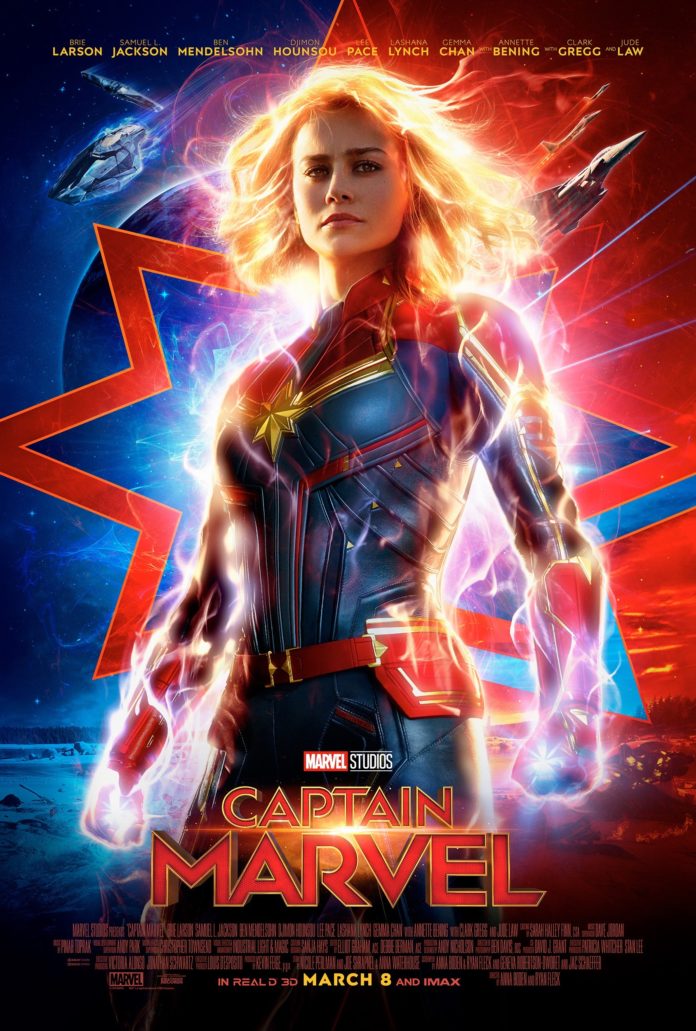Thomas Moran | Arts and Life Editor
Last week, Marvel released its first female origin story film, “Captain Marvel”—a historic milestone in a genre dominated by male protagonists. Long before its release, Marvel’s most recent movie “Captain Marvel” sparked controversy and chatter among comic fans and movie goers when the politically outspoken Brie Larson was selected to play Carol Danvers/Captain Marvel. Many rejected the choice, and some even took to online forums to review the film before its release, leading to policy changes on websites like Rotten Tomatoes, which disallowed prerelease audience reviews. Despite the controversial casting decision and preemptive reviews, co-directors Anna Boden and Ryan Fleck produced an engaging film, striking the perfect balance between promoting a pro-women message and not over-politicizing the action-packed film.
Beginning with her training as a soldier on a far away planet, the plot of the movie follows the story of Carol Danvers (Brie Larson) as she searches for answers to her mysterious past, of which she remembers very little. Early on, the film establishes internal conflict as Danvers attempts to earn the respect of her fellow soldiers, take control over her powers, the origins of which she is also unsure of, and piece together her foggy past. As the plot unfolds, the film takes countless twists and turns, making for an engaging and unpredictable storyline.
The film addresses the negative female stereotype of being hyperemotional by showcasing a protagonist who demonstrates emotional vulnerability as well as control and strength. Though several male characters look down on Danvers and tell her she needs to be devoid of emotion, Danvers finds she thrives in a balanced place of emotional expression and control.
Like many Marvel hero origin stories, “Captain Marvel” highlights the protagonist’s struggle against severe self-doubt. Several scenes feature flashbacks of her as a young girl getting beaten down, falling or failing in one way or another. Despite the multiple setbacks, Danvers manages to get back on her feet, revealing a deeply compelling, yet tastefully incorporated feminist message of standing in the face of adversity.
The movie also avoided the stereotype of scantily clad female heroes. In comic books, male heroes and villains are primarily portrayed in full-body clothing, if not a full set of armor. On the other hand, female heroes and villains are often portrayed in oversexualized, impractical outfits, showing as much skin as possible. Breaking that mold, Captain Marvel wears a full-body uniform of equal tightness and practicality as her male counterparts.
Perhaps the foremost feminist element of the film is Captain Marvel’s utter strength and power. With flight, photon blasts, superhuman durability and superhuman strength in her repertoire, Captain Marvel is one of the most powerful heroes introduced in the Marvel Universe so far. Before this movie was released, Many Marvel fans were completely unsure as to how the Avengers had any chance against Thanos who at the end of “Infinity War” was in possession of the Infinity Gauntlet, perhaps the strongest weapon in the universe. The addition of Captain Marvel has fans teeming with theories as to how the hero will help the Avengers in their fight against Thanos.
Beyond its seamlessly integrated pro-women elements, “Captain Marvel” is a highly engaging film with fast-paced action, remarkable special effects, a killer plotline, humor and more. Though it might not have blown viewers as far out of the water as DC’s “Wonder Woman,” “Captain Marvel” is an engaging film, suitable for most ages.






